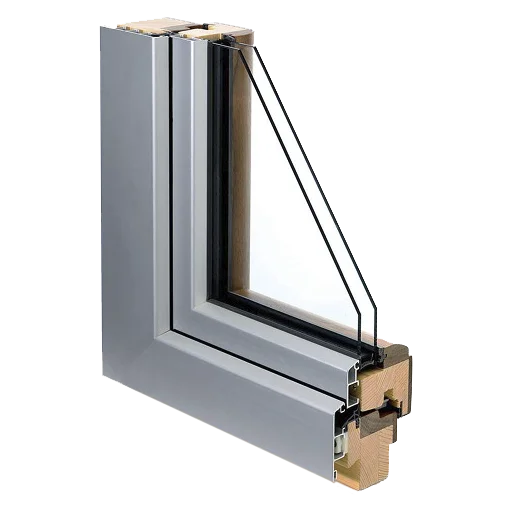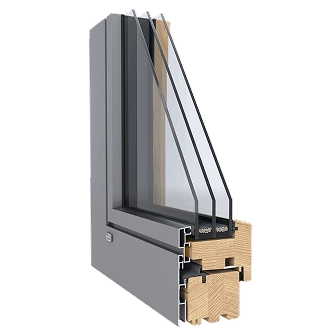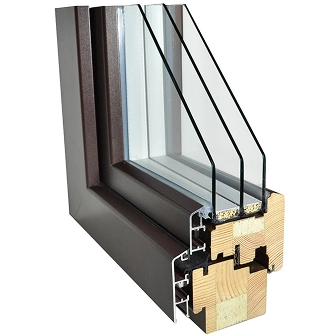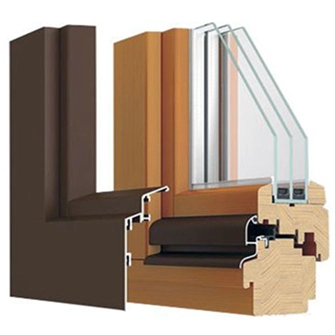Best choose
Aluminum
Aluminum is a silvery-white metal known for its low density, corrosion resistance, and excellent malleability. While it’s the most abundant metal in the Earth’s crust, it doesn’t naturally occur in its pure metallic form. Instead, aluminum is refined from ores such as bauxite, undergoing processes like the Bayer and Hall-Héroult methods to produce aluminum ingots or billets. These are then rolled, extruded, or otherwise fabricated into myriad products – including the slender, rigid frames for windows and doors.

High Strength-to-Weight Ratio
Allows for larger glass spans without requiring bulky frames or excessive reinforcements.
Recyclability
Aluminum can be recycled repeatedly without losing its core properties, providing eco-friendly benefits when properly recovered.
Durability and Low Maintenance
Resists warping, rust, and rot. Can last for decades when properly coated or anodized, with minimal upkeep.
Key Features of Aluminum Windows and Doors
- Narrow Sightlines
Aluminum’s structural strength allows for slim frames, maximizing the glass area. Ideal for scenic views or natural light in design-forward homes. - Thermally Enhanced Profiles
Modern aluminum systems use thermal breaks to counteract metal’s conductive nature, reducing heat transfer. - Weather Resistance
Resist rust, UV degradation, and general wear with minimal maintenance. Suit high-humidity or coastal climates if properly coated to prevent salt corrosion. - Minimal Upkeep
Wiping frames with mild soap and water generally suffices. Occasional inspections ensure the finish remains intact and hardware runs smoothly.



Frequently Asked Questions (FAQ)
Are aluminum windows and doors energy-efficient enough for cold climates?
Yes, provided they feature thermal breaks and high-quality seals. Look for models that meet ENERGY STAR standards in your region, and consider advanced glazing options like double or triple panes with Low-E coatings.
Is aluminum prone to rust?
No, aluminum does not rust like iron or steel. However, it can corrode or pit if the protective finish is compromised – particularly in salty or heavily polluted environments. Proper coatings and rinses help prevent this.
Do aluminum frames require painting over time?
Not necessarily. Many are coated, anodized, or powder-coated during manufacturing to provide a durable, long-lasting finish. While re-coating is possible if needed, most homeowners never have to repaint if they maintain the surface properly.
How do I limit heat loss or gain through aluminum frames?
Thermally broken profiles address this by incorporating non-metal insulating barriers between the interior and exterior frame. Pairing these frames with low-E, argon-filled glass also helps maintain a comfortable indoor climate.
Is aluminum cheaper than vinyl or wood?
The cost of aluminum frames varies widely. Entry-level systems may be comparable to or slightly more than mid-range vinyl, but premium, thermally improved or architectural-grade aluminum can approach or surpass wood or fiberglass in price. Always compare specific product lines and brands.
Can aluminum frames be customized in different colors?
Absolutely. Powder-coating, anodizing, or baked enamel finishes come in an array of colors. Some manufacturers offer custom color matching, though lead times and pricing may reflect this level of customization.
Are large sliding or folding glass walls with aluminum frames secure?
When well-designed, yes. High-quality aluminum systems often include multi-point locks, tempered or laminated glass, and robust hardware. This combination provides strong security, comparable to other premium window and door solutions.
Do aluminum doors and windows boost home resale value?
In design-driven markets, high-end aluminum systems can enhance a property’s appeal – especially when they deliver modern style and excellent energy performance. While vinyl or fiberglass may be more mainstream, the sleek aesthetic of aluminum resonates with many prospective buyers.


